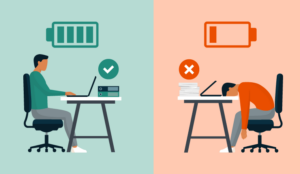Sunny Dhami of RingCentral discusses a few points on what can affect productivity in the workplace, so you know what pitfalls to avoid.
Social Media Overload
There are many answers to the question ‘how does technology affect productivity in the workplace?’. Some technology can be great for boosting motivation and efficiency, but if we’re talking about social media, we’d have to say that this particular piece of tech is somewhat of a productivity killer.
It’s no secret that your favourite networking sites are designed to keep users coming back for that dopamine hit the brain produces when we get a notification. So don’t feel too bad if you find yourself spending more time than you’d like scrolling the various feeds.
In fact, the realisation that you no longer find it as satisfying as you once did is probably a red flag. Actually reducing your social media time is where the discipline comes in, though:
- Try moving any apps in question away from the homepage of your phone and turn off push notifications for any apps you’re addicted to.
- Use browser plugins to help you. These can either lock you out entirely or simply make you aware of the time you’re spending.
- Log yourself out of all social media sites on your work computer (and put your phone out of sight if it’s too much of a temptation).
- If all else fails, deleting your accounts may be the only solution to getting the headspace you need to focus on work.
If you have to use social media to do your job (or even instant messenger-like services for communicating with customers), we’d recommend limiting your use to normal working hours. More on time management later in this article.
Unnecessary Meetings
How does the workplace affect productivity? With unnecessary meetings. There’s nothing worse than getting called up for a meeting that you’ve got nothing to do with, and you might feel unsure as to whether it’s rude to decline the invite or not.
Unnecessary meetings are a huge barrier to increasing employee productivity in the workplace. According to Atlassian, the company behind time-saving tech like Jira and Trello, the cost created by pointless meetings to U.S. businesses alone is somewhere around the $37bn mark.
In 2019, the Doodle State of Meetings Report priced that same trend at a cost of £45.4bn for the UK. What steps can you take to make sure you’re staying out of the boardroom when necessary? Your company might like to try the following:
- Coming up with a set agenda that’s sent out ahead of time. This allows people to see what the meeting’s about and bow out if it doesn’t concern them.
- Setting a time limit. A definitive end point can really work wonders in terms of making progress.
- When scheduling a meeting ask yourself: ‘Could this be an email?’
Noise
Workplace environment and productivity are closely linked. Especially when it comes to noise – which can be one of the big barriers to productivity, not least when you’re on a deadline.
If you’re in the office, you might be dealing with chatty colleagues, loud phone calls, or music playlists that aren’t up your street. And while you might get a little more peace at home, that probably won’t be the case for those with children, or a partner also working from the house.
The same goes for those who work remotely – noisy cafes and busy trains don’t typically make for great working environments.
So, a set of headphones or even earplugs are a must. Failing that, a ‘backup’ workspace (local hotdesk, library, or a quiet, dedicated room in your own home) can help.
Poor Time Management
Deadline ‘fear’, staying in the office too long, becoming distracted by checking your email, reluctance to prioritise – each of these symptoms can take a toll on your overall productivity.
What simple yet effective measures can you take to improve your time management?
First things first, make a list of priorities. Doing this the night before your working day helps you feel more organised and allows you to make a quicker start in the morning.
Set deadlines and stick to them – but be kind to yourself if you miss them. If you’re really struggling with a task, make sure you are as distraction-free as possible.
Switch off your notifications, close that inbox and turn off your phone if you have to.
There is, of course, technology that’s on your side in terms of time management. Trello, Monday, Grammarly to name a few examples.
RingCentral’s own contact centre fits into this category too. It includes time-saving features such as email categorisation, self-service for customers and dynamic reply assistance to give just a few examples.
Multitasking
Noble as it is, multitasking is overrated if you ask us. All too often productivity levels suffer at the hands of individuals being ‘spread too thin’ across different tasks. Tasks that often deserve dedicated focus and attention.
Multitasking more often than not leaves you open to mistakes and the dreaded possibility of having to start over. There’s plenty of research to support this fact.
Studies show that our brains are not designed to focus on multiple things at once, and that multitasking can lead to what psychiatrist Edward Hallowel, M.D. calls Attention Deficit Trait (ADT).
The antidote to over-scheduling yourself is simple. Learn what your natural capacity is and get used to saying ‘no’ to things you can’t handle. Or, better yet, ask for help.
Teamwork and productivity in the workplace go hand in hand, so don’t be afraid to stick to your limits.
Sleep Deprivation
This productivity killer is a bit of a no brainer. Lack of sleep quite simply translates as a lack of physical and mental energy to perform at your job.
There are those lucky few who can spring out of bed with just four hours of sleep but most mortals need their full eight hours in order to feel refreshed and ready for the day ahead.
If you find you have any of the following symptoms, you might not be getting enough rest: impaired judgement, poor concentration, decreased communication, and caffeine cravings.
Getting a good night’s rest is all about “sleep hygiene”, i.e. having a set “bedtime” routine that gives your body cues that it’s time to rest. It might include measures like switching off devices an hour or so before bed, reading a book, and making sure your bedroom is cool, dark, and quiet.
Poor Diet
We’re all prone to the odd cheat meal, but making consistently bad decisions on what we eat can see productivity levels drop drastically.
Ever notice that mid afternoon slump that comes after a lunch of junk food? That’s the inevitable comedown that happens when the sugar and empty carbs leave your bloodstream.
By making sure you’re well hydrated and eating foods that give you a more sustained release of energy you’ll be well set for a productive day.
Foods that are high in protein (like fish, chicken, turkey, chickpeas) are great for this, as are ‘smart’ carbs like sweet potato, nuts, leafy greens and whole grains.
Perfectionism
Last but by no means least on our list of things responsible for a loss of productivity in the workplace is perfectionism.
Yes, all projects need a certain degree of attention to detail in order to make sure they’re complete, but when it gets into micro-tuning the fine print, progress can really become stifled.
For us it’s about finding a balance between striving for excellence and actual output.
Look at it this way; if you don’t ‘finish’ something how can you learn from it and improve it for next time?
Learning to embrace any failures as valuable lessons will mean you can keep productivity at an optimum level and standards as high as (humanly) possible.
Getting Down to Business
Hopefully we’ve offered up some useful information in terms of productivity killers to look out for and ways to remedy them.

Sunny Dhami
The benefits of improving productivity in the workplace might be obvious, but harnessing that focus and the power that comes with it isn’t always easy.
That’s why we’ve designed our contact centre services to be as intuitive and efficient as possible.
From allowing you to manage large volumes of email, to machine learning that automatically understands an incoming message – there are plenty of built-in features there to help you be as productive as possible. Just don’t forget those pitfalls.
Author: Guest Author
Published On: 5th Feb 2021 - Last modified: 9th Feb 2021
Read more about - Guest Blogs, RingCentral















